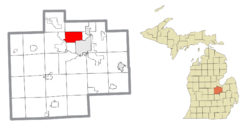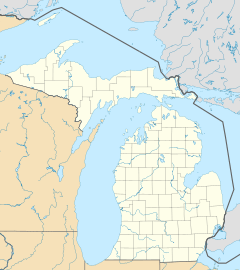Saginaw Township North, Michigan facts for kids
Quick facts for kids
Saginaw Township North, Michigan
|
|
|---|---|

Former CDP location within Saginaw County
|
|
| Country | United States |
| State | Michigan |
| County | Saginaw |
| Township | Saginaw |
| Area | |
| • Total | 13.5 sq mi (35.0 km2) |
| • Land | 13.5 sq mi (35.0 km2) |
| • Water | 0.0 sq mi (0.0 km2) |
| Population
(2000)
|
|
| • Total | 24,994 |
| • Density | 1,851.5/sq mi (714.9/km2) |
| Time zone | UTC-5 (Eastern (EST)) |
| • Summer (DST) | UTC-4 (EDT) |
| ZIP code(s) |
48602, 48603 (Saginaw)
|
| Area code(s) | 989 |
| FIPS code | 26-70545 |
| GNIS feature ID | 2393218 |
Saginaw Township North is a place in Saginaw County, Michigan, in the United States. It used to be called a "census-designated place" (CDP). This means it was an area defined by the government just for counting people in a census.
This community is part of Saginaw Charter Township. It covers most of the northern part of the township. There is also a Saginaw Township South in the southern part. In the year 2000, about 24,994 people lived in Saginaw Township North. This CDP was later removed and was not included in the 2010 census.
Contents
Communities in Saginaw Township North
Saginaw Township North is home to a few smaller communities. These places are not officially separate towns but are recognized areas within the township.
Lawndale: A Historic Stop
- Lawndale is a community located where Tittabawassee Road and Lawndale Road meet. It's right on the edge of Kochville Township.
- Long ago, Lawndale was a stop on the Pere Marquette Railway.
- A post office opened here in 1891. It was first named "Ohman" after its first postmaster, William Ohman.
- The name changed to Lawndale in 1892, but the post office closed in 1903.
Shattuckville: Named for a Mill Owner
- Shattuckville is another community found near the intersection of M-47/Midland Road, Shattuck Road, and Hospital Road.
- This area also had a post office. It opened in 1872 as "Redan" but closed quickly.
- The post office reopened in 1877 as Shattuckville and operated for about a year.
- The community was named after Samuel N. Shattuck, who owned a mill there. He was also the first postmaster.
- In 1884, Shattuckville had 68 residents. This was an increase from 46 people counted in 1880.
Geography and Land Area
Saginaw Township North covers a total area of about 13.5 square miles (35.0 square kilometers). All of this area is land, meaning there are no large bodies of water like lakes or rivers within its former boundaries.
Who Lives in Saginaw Township North?
Let's look at the people who lived in Saginaw Township North in 2000, based on the census data.
Population and Households
- In 2000, there were 24,994 people living here.
- These people lived in 10,704 households. A household is a group of people living together in one home.
- About 6,572 of these households were families.
- The area had about 1,851.5 people per square mile (714.9 people per square kilometer).
- There were 11,209 housing units, like houses or apartments.
Diversity of Residents
- The people in Saginaw Township North came from different backgrounds:
- 88.07% were White.
- 5.35% were Black or African American.
- 0.27% were Native American.
- 3.08% were Asian.
- 1.61% were from other races.
- 1.61% were from two or more races.
- About 4.09% of the population identified as Hispanic or Latino.
Family Life and Age Groups
- Out of all households, 25.5% had children under 18 living with them.
- Almost half (49.7%) were married couples living together.
- 9.1% of households had a female head with no husband present.
- 38.6% were non-family households, meaning people living alone or with unrelated roommates.
- About 32.4% of all households were made up of individuals living alone.
- 15.3% of households had someone aged 65 or older living by themselves.
- The average household had 2.26 people, and the average family had 2.87 people.
- The population was spread out across different age groups:
- 20.7% were under 18 years old.
- 10.2% were between 18 and 24 years old.
- 24.6% were between 25 and 44 years old.
- 24.8% were between 45 and 64 years old.
- 19.8% were 65 years or older.
- The median age was 41 years old. This means half the people were younger than 41 and half were older.
- For every 100 females, there were about 86.7 males.
Income and Poverty
- The median income for a household in Saginaw Township North was $42,481.
- For families, the median income was higher, at $56,641.
- Males earned a median income of $47,450, while females earned $30,300.
- The per capita income (income per person) was $24,466.
- About 4.3% of families and 7.1% of all people lived below the poverty line. This included 7.5% of those under 18 and 8.9% of those 65 or older.
 | Precious Adams |
 | Lauren Anderson |
 | Janet Collins |


